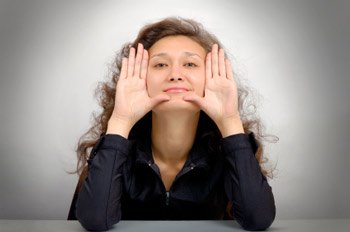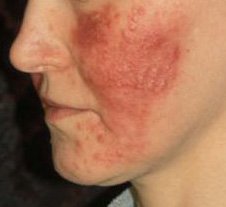What Is Rosecea, And How Can You Treat It?

You may have rosecea if you're fair-skinned but have a problem with redness in your face, especially across your nose, cheeks, chin, and forehead. Because in some people this skin disorder includes small pimples and bumps that look a lot like acne and because it affects mostly women ages 30-60, it's been called adult acne.
Actually, rosacea has nothing to do with acne and cannot be treated the same at all.
If you think you may have rosacea, look for these signs:
As rosacea progresses, it stops being a cute tendency to blush and becomes a problem, with oily skin, dandruff, and flaky skin. Enlarged oil glands in nose and cheeks swell, giving you a puffy look many people associate (wrongly) with alcoholism. And conjunctivitis in your eyes can become a serious problem.
No one is certain what causes rosacea, but since it shows up only in fair-skinned people, it likely has a hereditary source. Alcohol is not a cause of rosacea. However, anything that increases blood flow to your skin will make rosacea worse, including alcohol, spicy food, hot showers, and exercise.

Treating Rosacea
The worst thing you can do with rosacea is treat it like acne. It is not acne, and many acne medications will worsen your rosacea. Instead, talk to your doctor. He will help you control rosacea outbreaks with the right drugs and oral or topical antibiotics.
This will become a long-term regular course of treatment, and will be effective within about one to two months.
Learn more about rosecea treatment options.
You can treat rosecea yourself to a certain degree.
Because most of what you will be doing is minimizing exposure to triggers, you should still talk to a doctor for very troublesome rosacea. Start by keeping a record of your flareups and what you did prior to them that could cause increased blood flow to your face.
Next, use good sunscreen every day.
Use suncreen every time you go out and avoid direct sunlight, as it will increase blood flow to those sensitive areas. Protect your skin from redness due to cold in the winter by wrapping your face in a scarf.
Do not rub your face or touch it.
This irritates the skin and can bring germs to it that will make your rosacea worse. In addition, don't use alcohol or anything else drying on your skin; instead, use good-quality skin products that will not cause too much drying or damage to skin. Top medications for your rosacea with a good moisturizer designed for your skin type.
Use only noncomedogenic and hypoallergenic facial products.
You can use green or yellow tinted pre-foundations to counteract the redness in your skin; stop at the cosmetics counter in your local department store and ask one of the saleswomen to demonstrate how this works and help you match a color to your skin.
Avoid overheating, alcohol, smoking or being around any skin irritants of any sort.
Also avoid anything that makes your face heat: hot spicy foods, very hot foods, anger, corticosteroids, and if possible blood pressure medications, though your general health is much more important than your appearance!
All these techniques will minimize your rosacea problem and help you control bad outbreaks in the future.
Want to know more about Rosecea? Sign up for my free newsletter!




